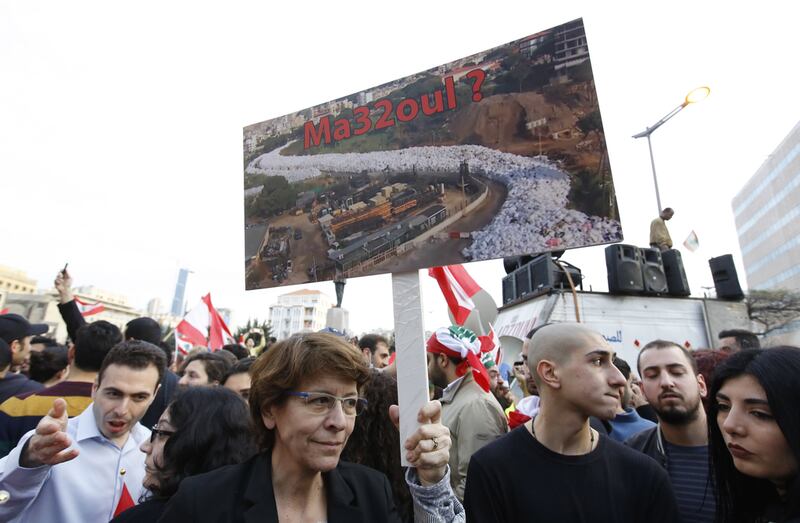The European Union stands accused of turning a blind eye to a growing environmental catastrophe in Lebanon. Namely, the dumping of two million tonnes of toxic waste directly into the Mediterranean, which threatens to wipe out fish stocks and kill the endangered turtles which lay their eggs at Sidon every year. The EU is also being blamed for wasting €16 million (Dh66 million) in funding on waste management plants that barely function, with two local “sorting and composting plants” closed and another defunct because its equipment was stolen.
The plants are supposed to deal with as much as 45 per cent of the country's waste but, according to local environmentalists, they have had little or no effect on the mountains of rubbish piling up in Beirut's suburbs. Photographs obtained by The National show that Lebanon's government has just completed a massive concrete lagoon for waste to serve as an underwater dump, threatening to harm sea life and to spoil beaches for hundreds of kilometres along the coast, according to a leading academic on conservation. To many Lebanese, the "Costa Brava" dump near Beirut airport – which no one can enter as it is sealed off with tight security – is merely a landfill dump, but to others the word is an euphemism for something much more sinister.
Despite the EU’s considerable influence in Lebanon, where it spends €220 million a year on aid projects, some activists, academics and environmentalists claim the EU is reluctant to interfere with the sea dump.
"For sure the EU knows about this dumping as they even funded studies of the environmental impact and they are even funding the ministry of environment for waste management," says Paul Abi Rached of the NGO Terre Liban .
“They are following every step in waste management in Lebanon… they know everything that is going on. The European Commission is funding sorting and composting units and they don’t put any pressure at all on the government about the [sea] dumping.”
He says the rubbish dumped into the sea is “100 times more toxic than raw sewage”.
Rached believes European governments such as France have pressured the EU to avoid antagonising the Lebanese government, because the country is hosting up to two million Syrian refugees.
“The government claims that the rubbish will be treated before it’s dumped into the water,” says Wadi El Asmaa, a leader of the You Stink! protest movement that sprang up in 2015 in response to the city’s rubbish crisis. Asmaa is clearly sceptical of government assurances. He says the government has failed to correctly operate two EU-funded plants and up to 10 sorting plants for Beirut, which he claims could halve the volume of rubbish, if run efficiently.
“We have asked the EU to help but it’s not that the government does not have the technical means… it’s more that these EU projects are almost entirely ineffective,” he says.
Asmaa claims that after the EU funds a project, it fails to follow up to check on whether there are any corrupting influences. He claims some EU projects just dumped the rubbish, while others burned waste at night, with EU officials none the wiser.
“Most of them just don’t work because of corruption, and it doesn’t matter if there is an EU badge on it. In one [plant], all of the equipment was stolen at the very beginning… None of them actually function as the EU doesn’t seem to care about the corruption which is going on,” he says.
“The EU is planning on spending a further €60 million on these plants, but it’s a waste of time and money as all that is going on in these operations is corruption,” says environmentalist Antoine Moussa, of Lebanon Eco Movement. He cites an example of two EU plants that are now closed. “One EU plant, Kfour, had political parties squabbling over who would run it, and there was a scandal about hospital waste being found there. Another, Ansar, is totally deserted now with all the equipment stolen.”
Moussa blames failures in the EU programmes as contributing towards the creation of the sea dump. “When the government saw that the EU sorting centres and municipalities were not working properly, they took another direction,” he says. .
Beirut-based EU official Nicolas Ritzenthaler denies his embassy knew of the sea dumping plant, but he admits “Operation and Maintenance [O&M] is a concern”. “Private operators in charge of O&M are not always fulfilling their duties in the most effective manner. O&M is financed by the government, not by us,” says Ritzenthaler.
Laury Haytayan is an anti- corruption campaigner in Lebanon and believes that the EU knew about the sea dump. She says “the garbage crisis is keeping politicians in power as it brings in money”, and this includes contracts for the sea dump. “It’s hardly surprising that the EU projects don’t work,” says Haytayan.
Many say another solution is needed to the garbage crisis to protect public health and the environment. Najat Saliba, a chemistry professor at the American University of Beirut, who is also director of the Nature Conservation Center (NCC), warns that the entire Mediterranean is at risk from pollution.
“The environmental impact on the water, animal life, ocean biodiversity and the whole marine ecosystem is horrific,” he says. “Leachate full of toxins will be sipping through the piles to contaminate the marine life. In addition to the toxins, organic matters will use up the oxygen in the sea and as such, deprive the marine life from its oxygen. Fish marine plants will get sick and die, algae will grow and mask the light from going into the sea, and this will enhance the life of bacteria that will eventually affect human lives.”
Martin Jay won the UN’s Elizabeth Neuffer Memorial Prize in New York for his journalism in the Middle East. He is based in Beirut.





